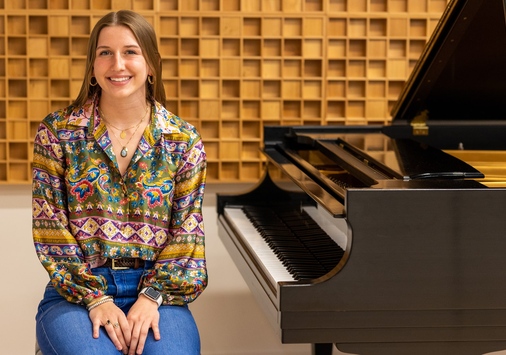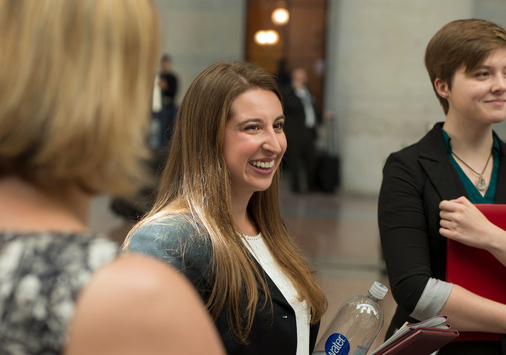Global Commerce major Heather Wiggins ‘19 has just been hired as the Assistant Box Office Manager for the Miller Auditorium in Kalamazoo, Michigan, a 3,500-seat theatre that is part of Western Michigan University.
In this Q & A she shares her experiences and the benefits of the GC major.
How did the knowledge you gained from majoring in Global Commerce help you navigate your post-graduate life?
While the business aspects of the GC major have been very helpful in understanding and working in the administrative side of the arts, my biggest takeaway from the program was the idea of flexibility and interconnectivity. Learning that everything is connected and impacted by each other has helped me to think outside the box and to approach every situation with the mindset that there are layers to it that I cannot see. This has been especially helpful as I am now working with a bare—bones theater administration to figure out the best way forward as we try to rebuild an industry that the pandemic severely harmed.
Was there a Global Commerce faculty member or classroom experience that challenged you in unexpected ways and/or that helped you prepare for your post-Denison life?
Dr. Ted Burczak taught some of the most challenging classes I took at Denison; the two that stand out were Economic Justice and Global Financial Markets. Both classes were rigorous for a variety of reasons, one of which being that he constantly pushed us to look at problems in a different way and to dig deeper into the gray areas. As someone who likes clear cut answers, organization, and boundaries, this was a difficult thing to confront. However, I am positive that this insight has made me a better thinker, problem solver, employee, manager, and person.
Do you feel your Global Commerce experiences prepared you for graduate school?
The level of writing, research, and quality discussion that was required in my GC classes was absolutely an asset when transitioning to a graduate program. I also found that doing extra research before class, even light searches, on topics that interested me really helped me to get the most from my courses and my interactions with my professors and classmates.
What would you like to do after receiving your Master’s degree?
I think at this point in my life and career I don’t have a specific plan or dream job. I know that I am incredibly passionate about communities, the arts, education, and the way that all three of these interact. I would love to eventually end up running a theater, but I can also see myself happy working in the education department of a community arts organization or in the administrative arm of a theater company.
What advice do you have for current juniors & seniors to help them launch successfully into post-Denison life?
It is both normal and okay to be wherever you are on your career and life journey. If you know exactly what job you want and how to get there, great! However, if you’re unsure what you want to do, that can also be great. I suggest finding time to contemplate what you want your life to look like: What kind of work/life balance do you want to have? In what kind of place do you want to live and work? Even if the answers are unclear, it will help you see your options as you get ready to graduate.
I am also a huge fan of organization and spreadsheets! My family and friends made fun of me, but the giant, color coded chart I made for to help me compare graduate schools allowed me to feel more in control and able to consider every aspect of the decision from financials and post-grad opportunities to what was available in the different cities.
What advice do you have for starting an internship/full-time position/grad school in remote/ COVID environment?
Be clear on what you need to work the best. For me that was a dedicated work space away from the distractions of my bedroom and kitchen. It also included creating a check-in schedule with my supervisor so that I didn’t forget anything and realizing that I work best in shorter time frames. For instance, on one of my remote internships I would work from 9-12, take a break and then work 4-6. This helped me make sure I didn’t get burned out from staring at my computer every day, and I was more productive with the shorter focused time.















